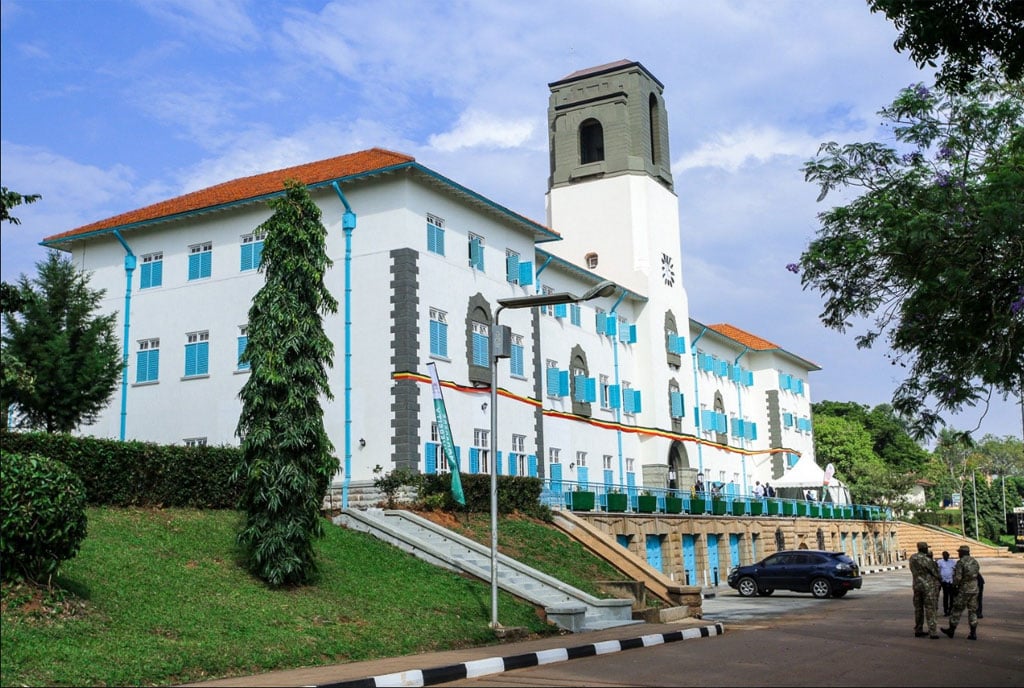
NSSF members line up at Workers' House in Kampala to apply for the 20 per cent mid-term access of their savings on March 7, 2022. The mid-term cash is for people who have saved with the Fund for 10 years and are above 45 years of age. PHOTO/ STEPHEN OTAGE
Millions of Ugandans who save in workplace pension schemes across both the public and private sectors in Uganda stand to have the disbursement of their retirement savings fundamentally changed if the government has its way.
Saturday Monitor understands that a package of measures being mooted by state actors intends to help savers manage their pension pot better throughout retirement.
The shake-up being mooted is one where, we understand, the models of the National Social Security Fund (NSSF) and the Public Service will leverage on each other’s strengths while shedding off the weaknesses.
For one, the government wants NSSF managers to give retiring savers gratuity once they clock 60 years as well as a lifetime monthly pension upon retirement.
“We want NSSF to reform and borrow from Public Service in future so that they can give savers gratuity and a monthly pay upon retirement,” Mr Prosper Muhumuza, the commissioner for disability affairs and elderly in the Ministry of Gender, Labour and Social Development, said of the proposal, adding, “They may not call it pension, but NSSF should be able to consistently pay retirees for at least 20 years because, on average, various studies indicate that civil servants, after retiring, live for an average of 19 years.”
Mr Muhumuza made the revelation whilst speaking to Monitor at the sidelines of the National Social Protection dialogue on October 29.
The dialogue that attracted parliamentarians, development partners, the academia and government officials was held under the theme: “Social Protection as an Enabler for Human Capital Development Across the Lifecycle”.
Mr Muhumuza, who said the proposal can be effectively implemented after the introduction of a minimum wage, asserted that the current arrangement, where NSSF pays a saver a lump sum of his or her savings upon retirement, was exposing some beneficiaries to bankruptcy barely weeks into retirement.
“Currently NSSF has this problem. When you work as a managing director for 30 years and retire, for example, you may be given Shs1.5 billion [as a single payment]. All this money may end up in the hands of money sharks in town, online betting, gambling, or unsuccessful business. It is better to get something for soap, and sugar every month,” he observed.
Learning from NSSF
Mr Muhumuza also revealed that during the recent quarterly social protection stakeholders’ meeting, the Ministry of Public Service also proposed that public servants should equally start contributing to the pension scheme on a monthly basis.
“We also want Public Service to adopt the model of National Social Security Fund into public service where an employee will contribute five percent and the employer (government) contribute 10 percent,” he disclosed, adding, “The Ministry of Public Service came up with this proposal to the government, saying pensions should be contributory. One, for ownership. Two, to get an enhanced figure. Currently, it's only [the] government contributing and civil servants are not being helped to save.”
Monitor understands that the Public Service intends to leverage on the NSSF model once the government has enhanced salaries for all public servants.
The government has so far increased the salaries of scientists, including science teachers.
President Museveni says salary enhancement for all civil servants will be done gradually once resources are available.
The President has, however, previously said the discussion of civil servants contributing to pension is valid and timely.
Speaking to Saturday Monitor this past workweek, Mr Muhumuza suggested that the process can kick-start with scientists whose pay has already been enhanced, arguing that many pensioners struggle upon retirement due to meagre benefits.
“When you interview the pensioners, they say the value of the pension is really small. So most pensioners have also been proposing to the government that when you increase the salary of science teachers or head teachers, then it should also affect the pension. When a head teacher earns Shs5 million, the amount should be factored in the pension of a retired head teacher to ensure they are recognised,” he said.
He added: “The challenge currently with a pension scheme for public servants is that when they increase the salary for scientists, it does not increase the pension of someone who retired in the 1980s or ‘90s. They remain at the rate that they were being paid at that time.”
NDP IV
The Ministry of Gender, Labour and Social Development by law is mandated to coordinate all social protection interventions of the government.
The ministry meets on a quarterly basis with NSSF, the Ministry of Public Service, the Uganda Pension Regulatory Authority, and the Ministry of Health, among others, where the former is briefed on the developments in the social protection industry.
Suggestions are also mooted to improve service delivery.
Stakeholders also alluded to the importance of coordinating and financing of social protection programmes.
“So our Gross Domestic Product (GDP) shows that the allocation of the national budget to social protection is still around 0.6 percent. I think if we went around 2.0 percent of our budget, it would really do a lot in terms of improving the wellbeing of vulnerable groups,” Mr Muhumuza said.
Ms Betty Amongi, the Gender, Labour and Social Development minister, confirmed that the government pension scheme is already being reformed under Public Service.
Minister Amongi said proposals that require amendments or policy shifts, like was being proposed, will be part of resolutions that she will present to the Cabinet.
“At Cabinet chaired by President Museveni, we are already undertaking macro-economic policies, social protection policy, and labour policy that are approved at a Cabinet level,” she said, further noting that Uganda’s approach to social protection interventions is inclusive, and pro-poor and has been structured in National Development Plans.
Minister Amongi said about 80 percent of people in the labour market work within the informal sector.
Their businesses, she added, should be formalised so that the government can monitor their wages.
Ms Pamela Mbabazi, board chairperson of the National Planning Authority (NPA), confirmed that pension reforms will be highlighted in the National Development Plan IV.
“We are focused and we have made it clear in the plan that we will reform the pension sector to increase the range of products offered. We want it to be more vibrant and embracive. We want to ensure that our pension sector works for Ugandans,” Ms Mbabazi said before tasking the NSSF to ensure that working Ugandans in the informal sector benefit from its services.
Hopeful.
We want NSSF to reform and borrow from Public Service in future so that they can give savers gratuity and a monthly pay upon retirement. – Prosper Muhumuza, Commissioner for Disability Affairs and Elderly in the Ministry of Gender, Labour and Social Development.
Policies.
At Cabinet chaired by President Museveni, we are already undertaking macro-economic policies, social protection policy, and labour policy that are approved at a Cabinet level. – Betty Amongi, the Gender, Labour and Social Development minister.
WORK TO BE DONE
Responding to the proposed reforms, Mr Filbert Baguma, the general secretary of the Uganda National Teachers’ Union (Unatu), expressed doubt and misgivings about the government’s ability to pay pensions on time.
“The government is playing hide and seek. What assurance is there that civil servants will get their retirement benefits instantly without bureaucratic tendencies which come along with corruption? There is a need for wide consultations for civil servants to appreciate the new arrangement,” Mr Baguma advised. The Unatu general secretary said the focus should be on enhancing civil servants’ salaries.
Mr Aron Mugaiga, the secretary general of Uganda Professional Science Teachers’ Union (UPSTU), said: “The government should sensitise the civil servants well about the benefits of this new proposal and they should conduct consultative meetings with people in civil service to ensure a smooth transition to the new policy.”
Ms Flavia Kabahenda, the chairperson of the Uganda Parliamentary Forum on Social Protection, expressed concern over the small number of Ugandans benefiting from social protection programmes.
“Funding for social protection remains very inadequate and this has become perennial. We cannot talk about transforming Uganda’s economy and leaving no one behind when only 3.1 percent of our population is covered by social protection benefits,” Ms Kabahenda said. She explained that vulnerable groups such as persons with disabilities, children living in poverty, and informal sector workers who form the backbone of Uganda remain largely unprotected. In the area of policy, Ms Kabahenda noted that the National Social Protection Policy, the National Social Protection Strategy, and other frameworks must ensure that all Ugandans are covered, including those in the informal sector.







